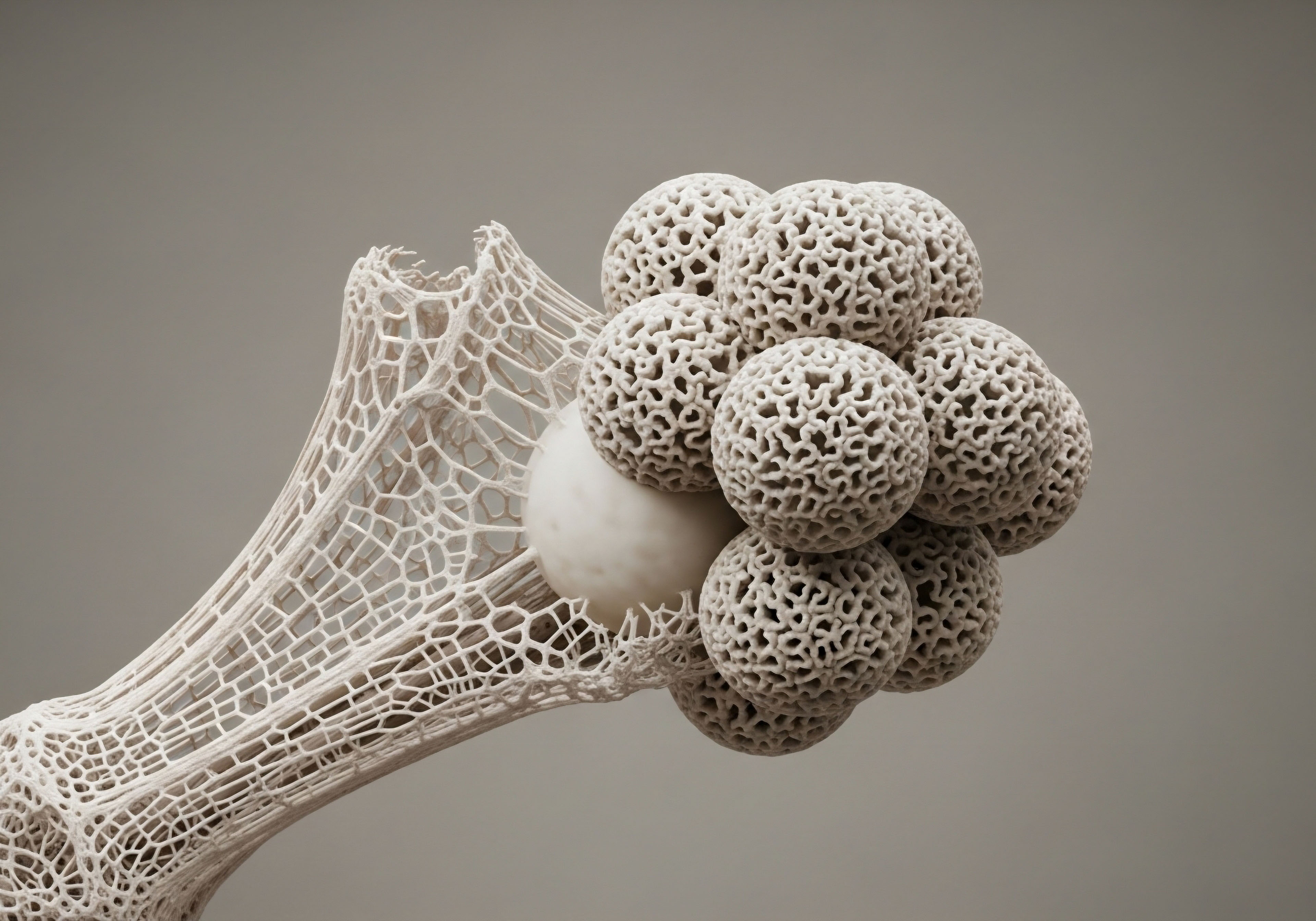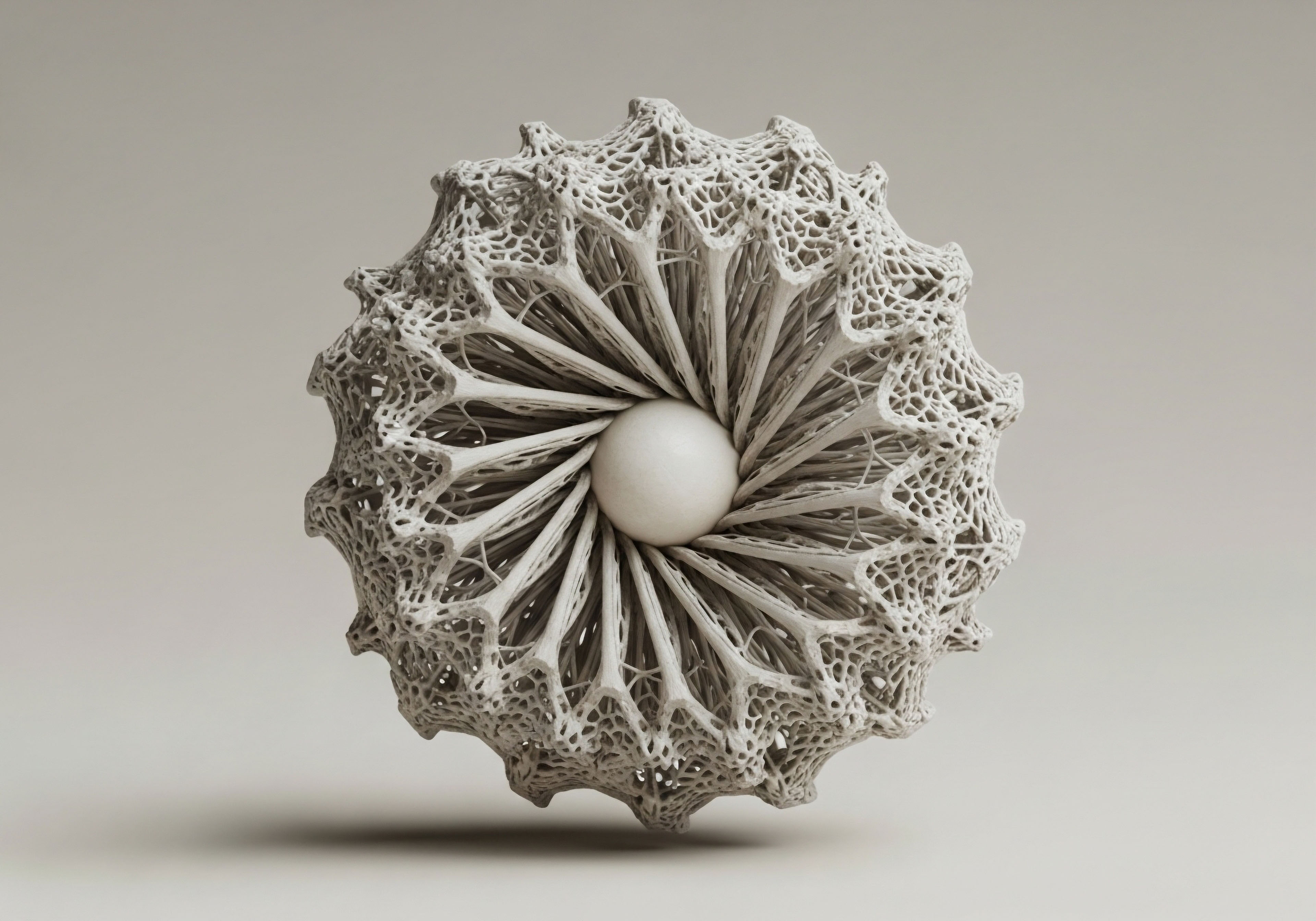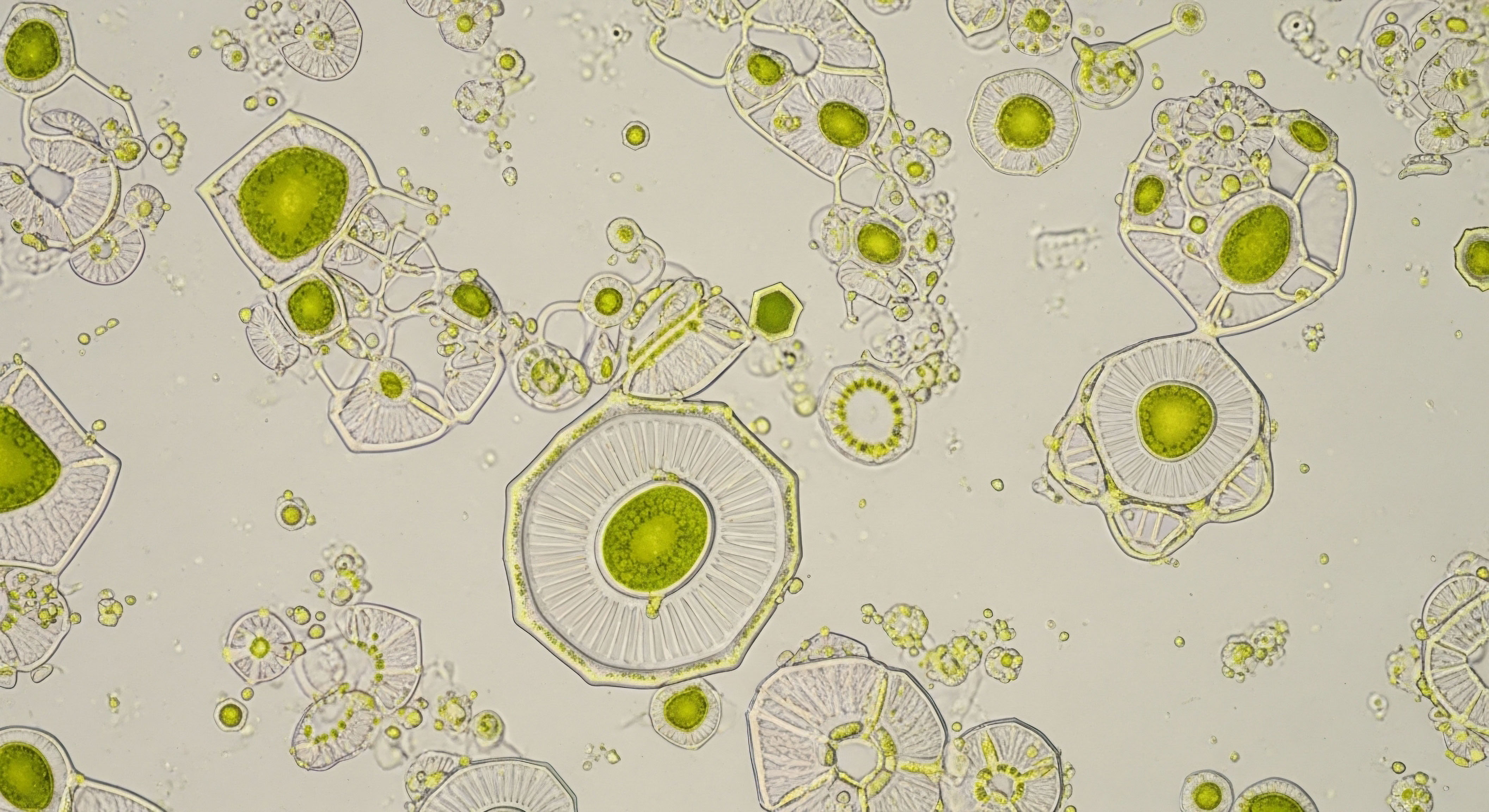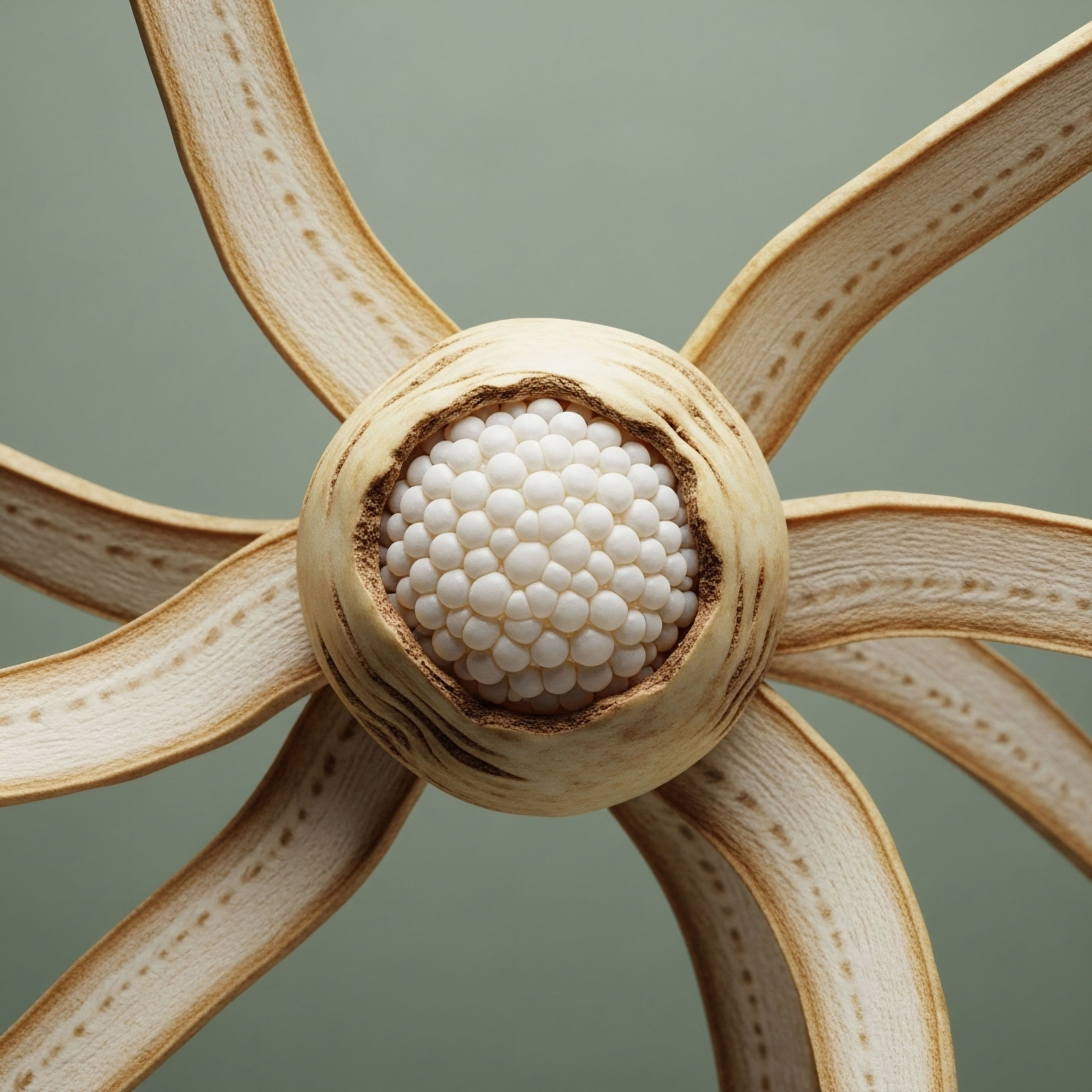

Fundamentals
You may feel it as a subtle shift in your resilience, a change in how your body responds to seasonal challenges, or a general sense that your internal defense systems are not as robust as they once were. This experience, a common narrative in the journey of aging, is deeply rooted in the intricate communication network of your body’s endocrine system.
The question of whether hormonal optimization protocols can support immune function is a valid and pressing one. The answer begins with understanding that your immune cells are constantly listening to hormonal signals. These chemical messengers, like estrogen and testosterone, are fundamental conductors of your biological orchestra, and their shifting levels directly influence the behavior of the cells that protect you from pathogens.
As the body moves through different life stages, particularly during perimenopause and andropause, the production of key sex hormones naturally declines. For women, the decrease in estrogen is a significant event. Estrogen receptors are found on a wide array of immune cells, including T-cells, B-cells, macrophages, and dendritic cells.
This means that estrogen has a direct line of communication to the front-line soldiers and strategic commanders of your immune system. A decline in estrogen can lead to a less coordinated and sometimes delayed immune response, which may manifest as an increased susceptibility to infections. Studies have indicated that lower estrogen levels are associated with a reduction in the function of certain white blood cells, which are critical for fighting off pathogens.

The Hormonal Influence on Your Body’s Defenses
The relationship between your hormones and your immune system is one of dynamic modulation. Think of hormones as setting the baseline readiness of your internal security forces. When hormonal levels are balanced and optimal, the immune system can mount a response that is both vigorous and appropriate.
It can effectively identify and neutralize threats without overreacting and causing collateral damage in the form of excessive inflammation. This balance is a key aspect of overall wellness, as a dysregulated immune response can contribute to a wide range of health issues.
Hormonal shifts throughout life, especially the decline in estrogen, directly impact the operational readiness of the immune system.
For men, testosterone also plays a crucial role in this regulatory process. While the effects of testosterone on the immune system are complex and still being fully elucidated, it is clear that extremes in testosterone levels, both high and low, can negatively impact immune function.
Low testosterone, a condition often associated with andropause, has been linked to increased inflammation and a potential predisposition to certain autoimmune conditions. This underscores the principle that optimal immune function is a matter of balance, not simply of having more or less of a particular hormone. The goal of hormonal support is to restore that balance, bringing the body’s internal environment back to a state where the immune system can perform its duties effectively.


Intermediate
Understanding the connection between hormonal recalibration and immune function requires a closer look at the specific mechanisms at play. When we talk about supporting the immune system through hormone replacement therapy (HRT), we are referring to a sophisticated biological process that goes far beyond simply boosting immunity.
The interaction is one of modulation, where hormones like estrogen and testosterone fine-tune the activity of various immune cell populations, influencing their development, distribution, and function. This calibration is essential for maintaining a state of immune homeostasis, where the body can mount a robust defense against pathogens while simultaneously preventing the kind of overactive response that can lead to autoimmune conditions.
Clinical protocols for hormonal optimization are designed to restore physiological levels of these key hormones, thereby influencing the immune system in a targeted manner. For postmenopausal women, estrogen replacement has been shown to have a positive effect on several aspects of immune function.
For instance, some studies have found that women undergoing HRT have higher numbers of lymphocytes, a type of white blood cell that is central to the adaptive immune response, compared to women not receiving treatment. This suggests that restoring estrogen levels can help maintain a healthy and responsive population of these critical immune cells.
The protocols for women often involve low doses of testosterone cypionate alongside progesterone, tailored to the individual’s menopausal status, to achieve a balanced hormonal profile that supports overall well-being.

Comparative Effects of Hormones on Immune Cells
The influence of sex hormones on the immune system is not uniform; estrogen and testosterone exert different, and sometimes opposing, effects. This sexual dimorphism in immunity is a well-documented phenomenon, with females generally exhibiting more robust immune responses than males. This difference is largely attributed to the distinct immunomodulatory properties of estrogen and testosterone. The following table provides a simplified overview of their comparative effects on key components of the immune system.
| Immune Component | Effect of Estrogen | Effect of Testosterone |
|---|---|---|
| Antibody Production | Generally enhances B-cell function and antibody production. | Can have a suppressive effect on antibody production. |
| T-Cell Function | Promotes the activity of helper T-cells and can influence the CD4/CD8 ratio. | May down-regulate T-cell mediated responses. |
| Inflammation | Can have both pro- and anti-inflammatory effects, depending on the context. | Generally considered to have anti-inflammatory properties. |
| Autoimmunity | Higher levels may be associated with an increased risk of certain autoimmune diseases. | Lower levels have been linked to some autoimmune conditions. |

Protocols for Male Hormonal Optimization
For men experiencing the symptoms of andropause, Testosterone Replacement Therapy (TRT) is the standard protocol. This typically involves weekly intramuscular injections of testosterone cypionate. To maintain a balanced endocrine system, this is often combined with other medications.
Gonadorelin may be used to support the body’s natural production of testosterone, while an aromatase inhibitor like anastrozole can be prescribed to manage the conversion of testosterone to estrogen. This comprehensive approach aims to restore testosterone to an optimal range, which can have a beneficial impact on the immune system by reducing the low-grade inflammation associated with hypogonadism.
Effective hormonal optimization protocols are tailored to the individual, aiming to restore a balanced endocrine environment that supports immune homeostasis.
It is important to recognize that the goal of these protocols is to achieve a physiological balance. Both excessively high and low levels of testosterone have been shown to be detrimental to immune function. Research has indicated that men with very high levels of testosterone may have a less efficient response to vaccines, suggesting a muted immune response.
Conversely, low testosterone has been associated with an increase in pro-inflammatory cytokines. Therefore, the clinical objective is to normalize hormone levels, thereby creating an internal environment that is conducive to a well-regulated and effective immune system.


Academic
A sophisticated analysis of the interplay between hormone replacement therapy and immune function requires moving beyond a simple cause-and-effect model to a systems-biology perspective. The endocrine and immune systems are deeply intertwined, communicating through a complex network of signaling molecules, receptors, and feedback loops.
Sex hormones, particularly estradiol and testosterone, function as potent immunomodulators, meaning they orchestrate shifts in the immune landscape rather than simply suppressing or enhancing it. Their influence is context-dependent, varying with the specific immune cell type, the local tissue environment, and the presence of inflammatory stimuli. Understanding this complexity is essential for appreciating the potential of hormonal optimization to support long-term wellness.
Estrogen’s role in immunity is particularly multifaceted. It can exert both pro-inflammatory and anti-inflammatory effects, a duality that is mediated by its binding to two different estrogen receptors, ERα and ERβ, which are differentially expressed on various immune cells.
For example, estrogen can promote the expansion and activation of T-regulatory cells (Tregs), which are crucial for downregulating immune responses and maintaining self-tolerance. This is one of the mechanisms by which estrogen may exert a protective effect in certain autoimmune conditions.
However, estrogen can also enhance B-cell activation and antibody production, which, in some contexts, can contribute to the pathogenesis of antibody-mediated autoimmune diseases like systemic lupus erythematosus. This highlights the nuanced nature of estrogen’s immunomodulatory effects; its impact on immune health is a matter of precise regulation, not just presence or absence.

How Does Testosterone Modulate Immune Pathways?
The concept of testosterone as a purely immunosuppressive hormone is an oversimplification. A more accurate model is one of immunoredistribution, where testosterone influences the trafficking and activity of immune cells. Recent research has shed light on the specific molecular pathways through which testosterone exerts its effects.
Studies involving transgender men undergoing gender-affirming hormone therapy with testosterone have provided valuable insights. These studies have shown that testosterone administration leads to a downregulation of the type 1 interferon pathway, which is often overactive in autoimmune diseases that are more common in females.
At the same time, testosterone can upregulate the TNF pathway, an inflammatory pathway that plays a role in the acute response to infection. This suggests that testosterone shifts the immune system’s focus, potentially dampening certain autoimmune-related pathways while priming others involved in fighting acute infections.

The Intricacies of Hormonal Influence on Autoimmunity
The relationship between sex hormones and autoimmune disease is a critical area of research. The higher prevalence of autoimmune conditions in women is a strong indicator of the profound influence of hormones on immune tolerance. The effects of progesterone are also relevant in this context.
Progesterone is generally considered to be immunosuppressive, a property that is essential for preventing the maternal immune system from rejecting the fetus during pregnancy. It has been shown to inhibit the production of pro-inflammatory cytokines and promote a Th-2-like cytokine profile, which is less aggressive than the Th-1 response.
In the context of autoimmune disease, low progesterone levels may contribute to an environment where the immune system is more prone to flaring. The following table outlines some of the key hormonal influences on autoimmune regulation.
| Hormone | Primary Receptor(s) | Key Immunomodulatory Actions | Relevance to Autoimmunity |
|---|---|---|---|
| Estradiol (E2) | ERα, ERβ | Modulates T-cell differentiation, enhances B-cell function, influences cytokine production. | Can be protective or pathogenic depending on the disease and cellular context. |
| Testosterone | Androgen Receptor (AR) | Downregulates Type 1 Interferon pathway, upregulates TNF pathway, anti-inflammatory effects. | Low levels are associated with some autoimmune diseases; high levels may suppress certain immune responses. |
| Progesterone | Progesterone Receptor (PR) | Suppresses Th-1 response, promotes Th-2 response, inhibits inflammatory cytokine production. | Generally immunosuppressive; low levels may contribute to immune dysregulation. |
The clinical application of this knowledge involves carefully titrated hormonal protocols designed to restore a more balanced immune state. For men with low testosterone, TRT can help to reduce the pro-inflammatory state associated with hypogonadism.
For postmenopausal women, HRT can help to counteract some of the age-related changes in the immune system, such as the decline in lymphocyte numbers and the shift towards a more pro-inflammatory phenotype.
Peptide therapies, such as Sermorelin or Ipamorelin, which stimulate the body’s own production of growth hormone, may also play a supportive role by influencing cellular repair and regeneration, further contributing to a healthy internal environment. The ultimate goal of these interventions is to re-establish the intricate hormonal symphony that governs immune function, promoting resilience and long-term wellness.
- Immunosenescence ∞ The age-related decline in immune function, which can be influenced by hormonal changes. HRT may help to partially reverse some aspects of immunosenescence.
- Cytokine Profile ∞ Hormones can shift the balance of cytokines, the signaling molecules of the immune system. For example, progesterone tends to promote a Th-2 cytokine profile, which is generally less inflammatory than a Th-1 profile.
- Lymphocyte Proliferation ∞ Some studies have shown that HRT can increase lymphocyte proliferation in response to pathogens, indicating a more robust immune response.

References
- Cutolo, M. et al. “The role of sex hormones in the development and progression of rheumatic diseases.” Rheumatic Disease Clinics of North America, vol. 30, no. 1, 2004, pp. 1-13.
- Gubbels Bupp, M. R. and Jorgensen, T. N. “The Immune System Is a Natural Target for Estrogen Action ∞ Opposing Effects of Estrogen in Two Prototypical Autoimmune Diseases.” Frontiers in Immunology, vol. 9, 2018, p. 495.
- Trigunaite, A. et al. “The Impact of Estrogens and Their Receptors on Immunity and Inflammation during Infection.” Microorganisms, vol. 10, no. 2, 2022, p. 408.
- Wira, C. R. et al. “Estrogen and progesterone regulate immune responses in the female reproductive tract.” Current Opinion in Immunology, vol. 22, no. 4, 2010, pp. 437-44.
- Picone, O. et al. “Progesterone ∞ A Unique Hormone with Immunomodulatory Roles in Pregnancy.” International Journal of Molecular Sciences, vol. 23, no. 3, 2022, p. 1245.
- “Testosterone’s role in immunity.” Chemical & Engineering News, 4 Sept. 2024.
- “Can Hormone Replacement Therapy Boost Your Immune System?” Ever-Est, 22 Sept. 2020.
- “Effects of Hormone Replacement Therapy on Selected Indices of Immune Function in Postmenopausal Women.” Gerontology, vol. 46, no. 4, 2000, pp. 191-197.
- “Effects of Hormone Therapy and Flavonoids Capable on Reversal of Menopausal Immune Senescence.” Journal of Clinical Medicine, vol. 10, no. 21, 2021, p. 5048.
- “Testosterone and Your Immune System.” Defy Medical, 8 Nov. 2022.

Reflection
The information presented here offers a window into the profound and intricate relationship between your endocrine system and your body’s innate defenses. Understanding these biological connections is a significant step in your personal health journey. It transforms the abstract experience of feeling “unwell” into a tangible set of interconnected systems that can be understood and supported.
This knowledge empowers you to ask more informed questions and to view your body not as a collection of separate parts, but as a holistic, integrated whole. The path to optimized wellness is a personal one, and it begins with this deeper awareness of your own unique biology. The next step is to consider how this understanding applies to your own life, your own symptoms, and your own goals for vitality and function.

Glossary

endocrine system

hormonal optimization protocols

immune function

sex hormones

andropause

your immune system

immune response

immune system

testosterone

autoimmune conditions

hormone replacement therapy

immune homeostasis

estrogen

hormonal optimization

progesterone

testosterone replacement therapy

hormone replacement

studies have shown that

cytokine profile

lymphocyte




